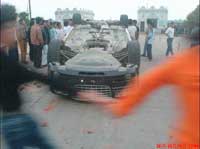What a suggestion: the US and Europe must join forces to combat the approaching enemy, who lies in wait armed with smiles, bows and a blood-lust for domination of world trade. Although the author at times refers to these enemies as “Asia,” he is referring specifically to China and India. The solution to the imminent threat will be a US-Nato free trade zone that stands up to the advancing enemies, insisting on fair and open trade policies. As a side benefit, the European and US cultures will converge, each benefitting from their respective positive attributes, while economies on both sides of the Atlantic will be stimulated. (Now does that all sound dreamy or what?)
It’s a great day for metaphors. The article I posted about below compares China to a lobster. This one compares China and other rising Asian powers to termites. It’s a fascinating argument, excerpted at length from War for Wealth: The Global Grab for Power and Prosperity, Germany’s best- selling book by Gabor Steingart. In some ways, it reminded me of the recent debate we’ve been having about Europeans and Muslims, and the challenge is similar: to what extent do you embrace and cooperate with those who harbor a vastly different set of values from your own? It is a question that every non-Asian doing busines in Asia has had to come to terms with at one time or another.
At airports in Beijing, Jakarta, Singapore and New Delhi red carpets lie ready, Western national anthems can be played flawlessly on cue — and they even parry Western complaints about intellectual property theft, environmental damage and human rights abuses with a polite patience that can only be admired. The Asians are the friendliest conquerors the world has ever seen.
A stoic and dark superpower
Their secret is stoic perseverance, the weapon they use to pursue their own interests while at the same time disregarding ours. What looks like a market economy in Asia, actually follows the rules of a type of society which former German chancellor Ludwig Erhard liked to call a “termite state.” In a termite state, it is the collective rather than the individual which sets the agenda. Tasks that serve the aims of society’s leaders are assigned to the individual in a clandestine manner that is barely perceptible to outsiders. It is a state that encourages as much collective behavior as possible but only as much freedom as necessary. We don’t know what they feel, we don’t know what they think and we have no way of guessing what they are planning. Indeed, this is what makes China a dark superpower.
Even if no one is prepared to say it outright, there are signs of a similar indifference to Western values all across Asia. But it is precisely that unspoken that separates the two worlds. Free labor unions are neither vilified nor permitted. Lip service is paid to the environment as something that should be protected, but at the same time it is torn apart like a car in a wrecking yard. Child labor is condemned even as it is actively tolerated. And a whole range of laws exist to protect Western intellectual property, but those rules are seldom applied.
The Asian elite politely brush off everything that matters to us — the social framework surrounding daily working life, the idea of individual achievement and state-guaranteed fair competition. What we see as essential characteristics of a civilized society, they see as nothing more than bourgeois niceties.
I’m ready for the “R” word to be invoked against the author. Risky as it is to make generalizations about broad groupings of people – especially when that grouping includes parties as disparate as the Chinese and the Indians – I found enough grains of truth in Steingart’s argument to make it worth thinking about. And yes, I know that some of the characteristics he defines as Asian, such as paying lip service to the environment, apply to my own government and business community as well.
Read the article – its alarmist tone is kind of quaint, its proposed solution seems hopelessly unrealistic, but many of its observations are thought provoking.


Comments